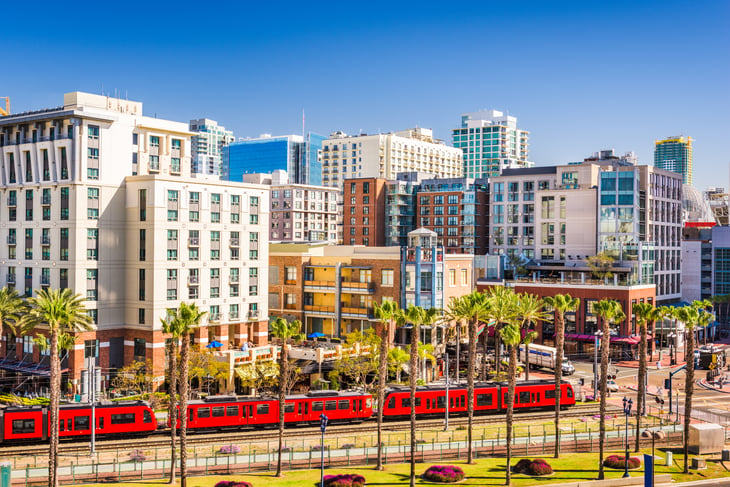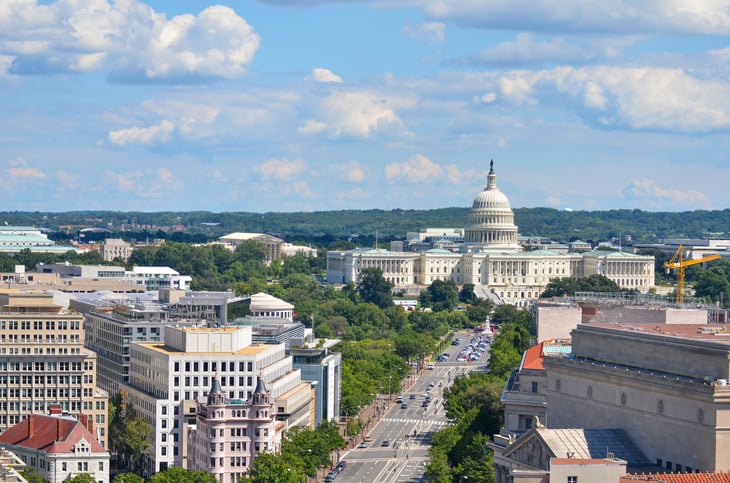
Editor’s Note: This story originally appeared on Smartest Dollar.
While recent economic trends have encouraged companies to relax degree requirements as a way to attract more workers, for the last several decades higher education has been tightly coupled with economic opportunity in the U.S.
Unemployment rates tend to be lower for people with greater educational attainment, and their wages tend to be higher.
According to the Bureau of Labor Statistics, the median weekly earnings for workers with a high school diploma total $809, but for college degree holders that figure is $1,334, while those with professional degrees earn a median of $1,924 per week.
The importance of education for economic opportunity has become even clearer as gaps in earnings between more- and less-educated workers have grown over time.
Many locations with economies that rely heavily on professional fields have the greatest educational wage gaps, in large part because the share of the population with higher education tends to be greater.
To determine the locations with the largest educational wage gaps, researchers at Smartest Dollar calculated the educational wage gap as the percentage difference in median annual wages for college graduates (including advanced degree holders) and high school graduates only.
Wages were calculated for full-time workers, and in the event of a tie, the location with the greater median annual wage for full-time college graduates was ranked higher. The data used in this analysis is from the U.S. Census Bureau.
Here are the U.S. metropolitan areas with the largest educational wage gaps.
15. Boston-Cambridge-Newton, MA-NH

- Educational wage gap: +90.0%
- Median annual wage for full-time college graduates: $95,000
- Median annual wage for full-time high school graduates: $50,000
- Percentage of full-time workers with college degrees: 62.8%
14. Fresno, CA

- Educational wage gap: +92.5%
- Median annual wage for full-time college graduates: $77,000
- Median annual wage for full-time high school graduates: $40,000
- Percentage of full-time workers with college degrees: 31.6%
13. New York-Newark-Jersey City, NY-NJ-PA

- Educational wage gap: +93.6%
- Median annual wage for full-time college graduates: $91,000
- Median annual wage for full-time high school graduates: $47,000
- Percentage of full-time workers with college degrees: 55.9%
12. Dallas-Fort Worth-Arlington, TX

- Educational wage gap: +97.5%
- Median annual wage for full-time college graduates: $79,000
- Median annual wage for full-time high school graduates: $40,000
- Percentage of full-time workers with college degrees: 45.4%
11. Detroit-Warren-Dearborn, MI

- Educational wage gap: +99.0%
- Median annual wage for full-time college graduates: $80,000
- Median annual wage for full-time high school graduates: $40,200
- Percentage of full-time workers with college degrees: 47.1%
10. Houston-The Woodlands-Sugar Land, TX

- Educational wage gap: +100.0%
- Median annual wage for full-time college graduates: $80,000
- Median annual wage for full-time high school graduates: $40,000
- Percentage of full-time workers with college degrees: 43.7%
9. Atlanta-Sandy Springs-Alpharetta, GA

- Educational wage gap: +100.0%
- Median annual wage for full-time college graduates: $80,000
- Median annual wage for full-time high school graduates: $40,000
- Percentage of full-time workers with college degrees: 51.2%
8. Chicago-Naperville-Elgin, IL-IN-WI

- Educational wage gap: +100.0%
- Median annual wage for full-time college graduates: $84,000
- Median annual wage for full-time high school graduates: $42,000
- Percentage of full-time workers with college degrees: 50.8%
7. Raleigh-Cary, NC

- Educational wage gap: +100.0%
- Median annual wage for full-time college graduates: $84,000
- Median annual wage for full-time high school graduates: $42,000
- Percentage of full-time workers with college degrees: 58.8%
6. San Diego-Chula Vista-Carlsbad, CA

- Educational wage gap: +100.0%
- Median annual wage for full-time college graduates: $90,000
- Median annual wage for full-time high school graduates: $45,000
- Percentage of full-time workers with college degrees: 51.1%
5. Seattle-Tacoma-Bellevue, WA

- Educational wage gap: +100.0%
- Median annual wage for full-time college graduates: $100,000
- Median annual wage for full-time high school graduates: $50,000
- Percentage of full-time workers with college degrees: 54.8%
4. Los Angeles-Long Beach-Anaheim, CA

- Educational wage gap: +119.5%
- Median annual wage for full-time college graduates: $90,000
- Median annual wage for full-time high school graduates: $41,000
- Percentage of full-time workers with college degrees: 46.2%
3. Washington-Arlington-Alexandria, DC-VA-MD-WV

- Educational wage gap: +122.2%
- Median annual wage for full-time college graduates: $100,000
- Median annual wage for full-time high school graduates: $45,000
- Percentage of full-time workers with college degrees: 63.1%
2. San Francisco-Oakland-Berkeley, CA

- Educational wage gap: +140.0%
- Median annual wage for full-time college graduates: $120,000
- Median annual wage for full-time high school graduates: $50,000
- Percentage of full-time workers with college degrees: 63.6%
1. San Jose-Sunnyvale-Santa Clara, CA

- Educational wage gap: +180.0%
- Median annual wage for full-time college graduates: $140,000
- Median annual wage for full-time high school graduates: $50,000
- Percentage of full-time workers with college degrees: 64.9%
Methodology

The data used in this analysis is from the U.S. Census Bureau’s 2021 American Community Survey.
To determine the locations with the largest educational wage gaps, researchers at Smartest Dollar calculated the educational wage gap as the percentage difference in median annual wages for college graduates and high school graduates.
Wages were calculated for full-time workers, and in the event of a tie, the location with the greater median annual wage for full-time college graduates was ranked higher. To improve relevance, only metropolitan areas with at least 100,000 residents were included.
